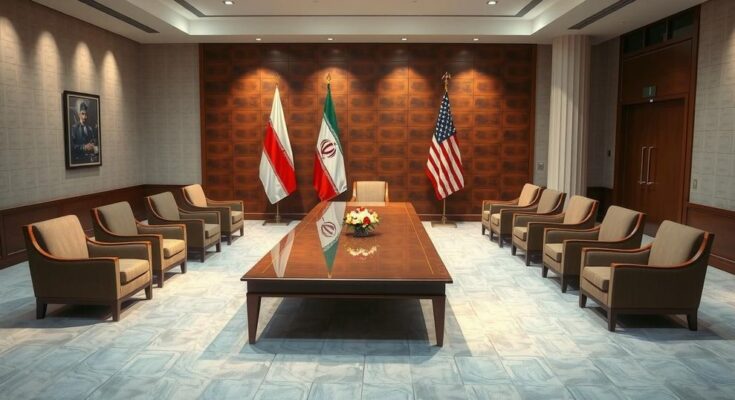Iran and the U.S. are set to continue negotiations regarding Tehran’s nuclear program in Oman on April 26, following a second round of discussions in Rome. Iranian officials have expressed a commitment to a constructive dialogue aimed at alleviating sanctions, amidst a backdrop of complex regional tensions and domestic challenges in Iran.
On April 26, negotiations regarding Iran’s nuclear program are set to resume in Oman, as announced by Iranian Foreign Minister Abbas Araghchi. These negotiations follow a second round of talks held in Rome, indicating a potentially positive movement in discussions between Iran and the United States. Araghchi stated that there is hope for advancement following technical discussions that precede the formal talks.
The second round of negotiations concluded after several hours without an immediate readout from the U.S. side. Iranian officials expressed determination to continue engaging seriously in discussions aimed at lifting the severe economic sanctions affecting Iran. Araghchi emphasized that the negotiations would proceed in a constructive manner.
Historically, the engagement between Iran and the U.S. marks a significant turning point given the long-standing hostilities stemming from events such as the 1979 Islamic Revolution. This second round follows the U.S. withdrawal from the nuclear agreement in 2018, which has led to ongoing tensions and failures to restore prior accords.
The backdrop of these negotiations includes heightened tensions in the Middle East due to conflicts such as the Israel-Hamas war and U.S.-backed airstrikes in Yemen. As former President Donald Trump reiterated his stance on preventing Iran from acquiring nuclear weapons, Iranian representatives, including Araghchi, conveyed intentions to reciprocate with an amicable agreement.
Discussions took place at the Omani Embassy in Rome, facilitated by Omani Foreign Minister Badr al-Busaidi. This reflects Oman’s longstanding role as a mediator between Iran and Western nations. Italy’s Foreign Minister, Antonio Tajani, pledged Italy’s readiness to support ongoing dialogue.
In preparation for the upcoming talks, both Araghchi and U.S. envoy Steve Witkoff were engaged in prior diplomatic efforts. The potential involvement of Russia in any future agreement is being highlighted, particularly regarding the storage of Iran’s enriched uranium, a critical component of the negotiations.
There remains significant domestic unrest in Iran over political issues, including the mandatory hijab law and rising economic pressures. Recent developments indicate fluctuations in Iran’s currency value as a result of the negotiations, alongside the arrival of Airbus aircraft, raising questions about ongoing U.S. sanctions.
In summary, the continuing dialogue between Iran and the U.S. has opened new doors for diplomatic resolution amidst a complex backdrop of regional tensions and internal challenges in Iran.
The continued negotiations between Iran and the United States signify a crucial step toward potentially resolving long-standing tensions relating to Iran’s nuclear ambitions. The forthcoming discussions in Oman are expected to address significant issues, particularly the lifting of economic sanctions and the future of Iran’s nuclear program. The involvement of international mediators like Oman and the complexities surrounding regional stability will play a pivotal role in shaping the outcome of these discussions.
Original Source: www.wdrb.com




